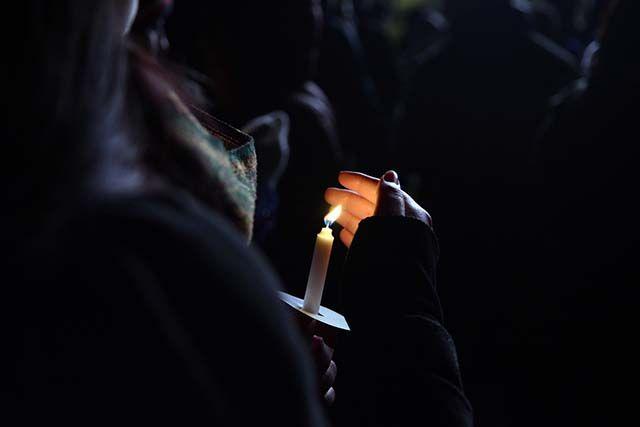
Mary Goughnour
Candles being lit in honor of Deah, Yusor, and Razan at the Our Three Winner Memorial in tribute of the one year anniversary of their passing. The Memorial took place outside of Talley Student Union on Wednesday, Feb. 10 2016.
Reminiscent of the chilling wind and cold of last year’s candlelight vigil for Deah Barakat, his wife Yusor Abu-Salha and her sister Razan Abu-Salha, hundreds of students, faculty members and members of the Triangle Muslim community gathered at Stafford Commons Wednesday evening for the Day of Light memorial to commemorate the one-year anniversary of their deaths.
Dr. Mohammad Abu-Salha, the father of Yusor and Razan, spoke about the importance of civic action and encouraged Americans to make sure that they stand up for justice and liberty.
“Make sure to vote and keep your democracy and keep your liberties,” Abu-Salha said.
Abu-Salha and Farris Barakat, Deah’s older brother who Abu-Salha called his “new son,” said they were pleased with the support they had received from all Americans, as well as from President Barack Obama. In light of the recent Islamaphobic rhetoricthat has emerged from the presidential campaign season, last week Obama visited a U.S. mosque for the first time during his presidency. Dr. Suzanne Barakat, the elder sister of Farris and Deah, was invited to attend the meeting with the president, sitting next to him during a panel discussion.
During that speech, Obama made clear that Muslims play a vital role in American society, and on Wednesday evening Abu-Salha reiterated those points.
“The U.S. has had an Irish way of life,” Abu-Salha said. “The U.S. has had a Hispanic way of life. The U.S. has a black American way of life. The U.S. has a Native American way of life, and now the U.S. has an Indian way of life. We Muslims are just another part of this American life.”
Farris said he especially appreciated the president’s effort to dispel any dichotomy between being Muslim and being American.
“It is time that we can be Muslim in America,” Farris said. “You are Muslim, and you are an American, and you don’t have to choose between the two. The one thing that stood out to me is that Obama thanked us. You know, for so long, Muslims have been on the defensive.”
During both the news conference and the vigil service, members of the Barakat and the Abu-Salha families again debunked the notion that the tragedy had anything to do with a parking dispute.
“The idea that Deah, Yusor and Razan’s murders were over a parking dispute is like saying that Rosa Parks getting kicked off the bus was a busing issue,” Farris said.
The vigil began with a traditional Muslim call to prayer before members of the family and representatives of the university spoke to the audience.
Chancellor Randy Woodson and UNC-Chapel Hill Chancellor Carol Folt spoke about how the tragic event had created bonds that will keep the institutions connected for a long time to come.
Since the tragedy, NC State has created an Our Three Winners scholarship fund that currently provides tuition aid to six students annually.
At UNC-Chapel Hill, the dental school, where Deah was a second-year student has held its own “Deah Day,” when dental students spend the day performing philanthropy and community service work, which he, Yusor and Razan all spent considerable time doing.
However, the influence of their good works reach far beyond the Triangle.
In tandem with the United Muslim Relief Fund, the family has also worked together to create an Our Three Winners endowment which has raised more than $865,000. Dr. Abu-Salha said he hopes that number will be raised to about $5 million during the next three to four years. Abu-Salha said the family will use the proceeds from investing the endowment to continue to support tarnished areas in Muslim communities in the Middle East.
“What this tragedy has taught us is who Muslims are,” said Dr. Nouman Siddiqui, a Raleigh-based ophthalmologist and friend of the Barakat and Abu-Salha families. “In everything they did they were following Muslim ideals, whether it be charity or smiling or caring for others or striving hard at work or school — that’s part of Islam, so that, to me, is what’s so beautiful about their story and their legacy. As people get to know their lives and get to know them more and more, they start to recognize that. [That love] didn’t just start in a vacuum. It came from love in their families, and it came from their foundation in their faith.”
Siddiqui blamed the fear of Islam on media portrayal and a lack of exposure of true Islamic culture in many American’s lives.
“The reality is seven out of 10 Americans don’t know a Muslim, and this is how you find out what Muslims are.”
Gavin Stone contributed reporting to this article.